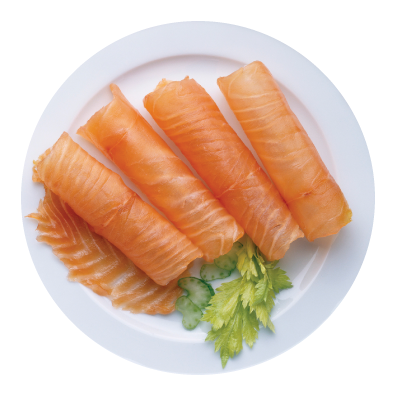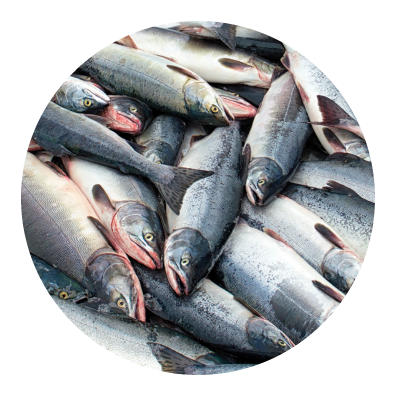Something's fishy about lox
Take Action
Virtually all kosher chickens, cattle, and fish suffer the worst abuses of factory farming, and everyone pays the price. Help your community transition to more humane and sustainable food practices with new resources, consultation, and training.
Perhaps few food items are more closely associated with Ashkenazi Jewish American culture than lox, bagels and cream cheese.
Whether brined or smoked, lox is, fundamentally, a cured meat. True lox (salmon) has fallen out of favor in recent decades due to its intense saltiness, and milder smoke-salt hybrids such as nova lox are now the preferred choice, but the Jewish taste for cured salmon is as strong as ever. In the past few years, American consumers have broken seafood consumption records, hitting 19 pounds per capita in 2019. Although much of the seafood category is treyf, or non-kosher to observant Jews, cured salmon is a significant part of those record-breaking numbers: Americans eat on average over four pounds of canned and cured fish alone per person every year. What most of these consumers don’t realize is where that fish comes from.
Just as we’re fed images of grass-fed cows, we’re led to believe that fish are taken from the ocean. Wild-caught salmon is no longer standard industry practice. What we think of as “fishing” is more accurately aquaculture. For a decade now, more fish globally have been farmed than caught, and in the case of salmon, the ratio sits at about 4:1, the three million farmed salmon far outnumbering their wild-caught counterparts. Norway and Chile raise about 80 percent of the world’s farmed salmon, with Canada, Britain, and the Faroe Islands rounding out the top five producers. Over two million metric tons of salmon are farmed every year. That’s a lot of lox.
But long before lox becomes lox, salmon roe are scooped a pitcherful at a time into freshwater incubator trays, and once hatched, they are moved from plastic tub to plastic tub until finally they become physiologically compatible with saltwater pens. The experience of a farmed fish is nearly devoid of opportunities for natural behaviors. Farmed fish don’t migrate, farmed fish don’t meet members of other species, and farmed fish don’t hunt. Normally predators in the wild, farmed salmon feed on pellets made up of ground-up fish also likely farmed at an aquaculture operation.
As with farmed land animals, farmed fish live in crowded and cramped conditions and may suffer from lesions and debilitating injuries. Stressful conditions cause disease and parasite outbreaks, like sea lice, that farmers respond to with pesticides and antibiotics. These treatment measures promote resistant strains of diseases that can harm both wild fish populations and public health. Given what we know about fishes’ capacity for stress and pain, aquaculture is abysmal for animal welfare.
That’s not to say “wild caught” fish is preferable to farmed. Overfishing has been an ongoing problem for decades. The North Atlantic cod fishery memorably collapsed in the early 1990s. Though the Canadian government put the kibosh on cod fishing back in 1992, populations still haven’t recovered. Perhaps the most significant problem with industrial fishing is bycatch: 40 percent of what fishermen catch in their trawlers is not what they mean to catch. Thirty-eight million tons of sea creatures are unintentionally caught every year, their corpses routinely dumped back into the ocean to make room in the nets for the next catch. This poses a threat not just to the millions of jellyfish, sharks, octopuses, urchins, skates, and unmarketable species of fish who are killed, but also to endangered species such as migrating loggerhead turtles, dolphins, and whales who can die from entanglement in fishing gear. The fishing industry is also a significant source of modern slavery, where people are trapped on remote fishing vessels in brutal conditions.
The true cost of fishing is always higher than it appears. From preserving wild habitats and species to caring for vulnerable workers, there are many Jewish values-based reasons to commit to alternatives to industrial fishing.

